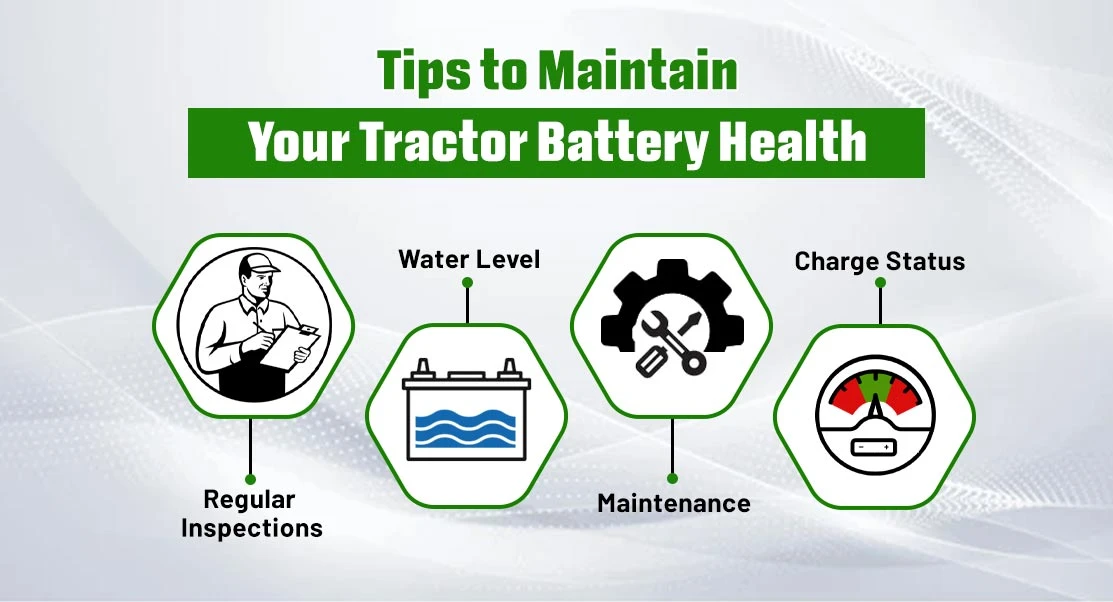A Complete Guide to Tractor Batteries: Functions, Types, and Maintenance

Table of Contents
- An Introduction to the Tractor’s Battery
- Functions of Batteries in a Tractor
- Types of Batteries in a Tractor
- Tips to Maintain Your Tractor Battery Health
- Tips for Replacing the Tractor Battery
- Choosing a New Battery for Your Tractor
- Summing Up
An Introduction to the Tractor’s Battery
Tractors are essential farm machinery in agriculture. To ensure that your tractor works for an extended period, you need to maintain your tractor and its components. One of the most important parts of a tractor’s electric system is its battery. Maintaining your tractor’s battery is necessary for smooth operations on the farm for a longer time period. Let’s look at some of the important facts and tips to maintain battery health in the right manner.
Functions of Batteries in a Tractor
- A tractor’s battery provides a source of current for starting the engine, lighting and using the horn.
- It also helps to control the voltage in the electrical system.
- It also stores the current produced by the alternator and supplies the current when the electrical demands instantly exceed the alternator output.
Types of Batteries in a Tractor
There are two types of batteries in a tractor: Lead-acid batteries and Maintenance-free batteries. Let’s understand the meaning of each of these batteries.
Lead-acid Batteries
These batteries are the most used types of batteries in a tractor due to their consistent power delivery in extended conditions and cost-effective performance. They just need periodic maintenance.
Maintenance-free Batteries
Maintenance-free batteries are modern types of batteries, also known as sealed or AGM batteries. These are sealed batteries and do not require maintenance, but they are more expensive when compared to lead-acid batteries.
An indicator is provided in a maintenance-free battery to show its working condition. Three colour codes are given on the side of the indicator. These are as follows:
- Green: The battery is healthy or fully charged.
- White: The battery needs charging.
- Red: The battery is dead.
Tips to Maintain Your Tractor Battery Health

Regular Inspections: Inspect all the terminals and connections of the battery on a regular basis to keep it free from rust or oxidation. If there is rust on the battery, immediately clean the rusty areas. Coat the battery with petroleum jelly to prevent future corrosion.
Water Level: checking the water level of your battery is another crucial step, as a battery requires the right amount of water for smooth performance. If your battery water level is low, add distilled water immediately. Adding tap water is not recommended as it contains some harmful minerals which can reduce the battery’s life.
Maintenance: Checking the surface of the battery to see if it is clean or not is essential. Keep your battery free from dust, dirt, and moisture. During cleaning, wear protective gloves, as acidic batteries can be hazardous. Several tractors now come with a battery cut-off switch, so if your tractor has one, use it during the rainy season to protect the tractor's battery.
Charge Status: Charging status is another important step. Monitor the charge status of your tractor’s battery. Inadequate charging may reduce the lifespan of the battery.
Tips for Replacing the Tractor Battery
- If you find any difficulty starting the tractor’s engine, change the battery.
- Change the battery quickly if any type of swelling or deformation occurs on the battery.
- If the battery is not giving sufficient power or indicates low voltage, it may need to be replaced. Check the voltage level through a voltmeter on instrument cluster.
- If your battery is not charging quickly or frequently discharges, you may need to buy a new battery now.
Choosing a New Battery for Your Tractor
- Ensure that the battery you are purchasing matches the tractor’s model and requirements.
- Make sure to buy a battery that is compatible with your tractor, including the capacity, voltage, and size of the battery.
- Moreover, select a high-quality and reliable brand that will provide better battery results in the long run.
Summing Up
As we have come to the end of this blog, let’s sum up the important points. Now that you know the steps to maintain your tractor's battery health, always consider doing the proper maintenance of the battery to ensure its longevity and high performance and save money. Concluding the blog, we would like you to check out Tractorkarvan for more informative tractor-related blogs.


Related Blogs












